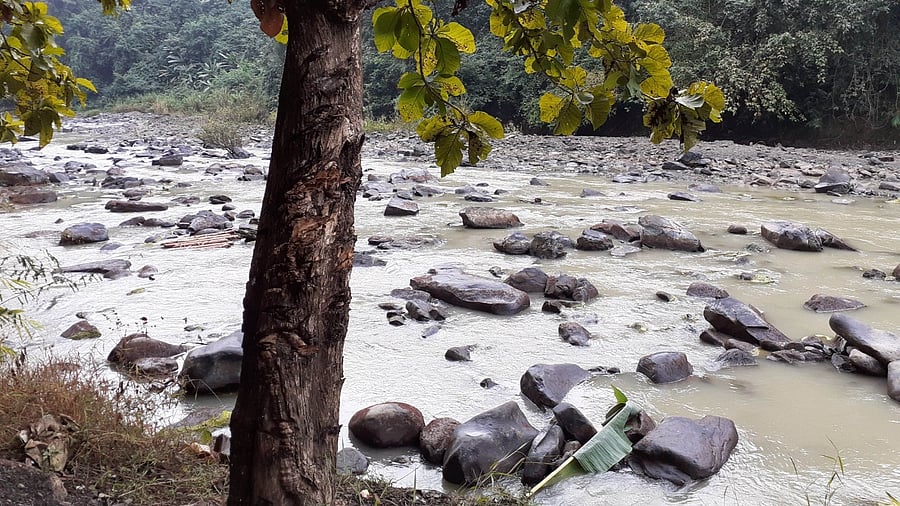
Dikhu River.
Credit: Metevinu Kechu.
Guwahati: The harmful modern ways of fishing such as the use of dynamites and electro fishing is gradually replacing the sustainable and eco-friendly traditional fishing practices by the Ao and Sumi tribes of Nagaland living along the Dikhu river, one of the tributaries of the Brahmaputra, a research team have pointed out.
The research team belonging to Nagaland University, which documented the fishing practices of the two tribes, stressed that large scale use of the harmful fishing methods can pose a threat to the ecology of the river that is crucial for survival of many species, local biodiversity and the economy.
A research project was implemented by Pranay Punj Pankaj, an associate professor of the university's Zoology department and Metevenu Kechu, a research scholar. A paper was published in the Journal of Fisheries.
The team documented 28 species of fish belonging to 13 families and three subfamilies, during the project funded by ICAR-National Bureau of Fish Genetic Resources, Lucknow.
Traditional fishing:
The Ao and Sumi are among the 16 major Naga tribes, who mainly reside in Mokokchung and Zunheboto districts, respectively. They have been practising the traditional means of fishing, both individually as well as for community fishing.
The communities used fasi jal (gill net), zutsuk (cast net), porki/bulci (hooks and lines harpoon), talu tatu (tubular shaped traps), shiba (conical-shaped trap), besides bamboo-made fishing baskets and storage baskets.
"Crafts and gears in traditional fishing are typically made from locally available and cost-effective materials such as bamboo and ropes that require less expertise and ease of operation than modern technical equipment. Increasingly, indiscriminate fishing has become a problem in aquatic waters due to modern machinery, while traditional fishing skills and practices are dwindling," the paper said.
The team documented the traditional fishing practices in at least 10 villages through interviews with village headmen, village council members, fishermen, traditional knowledge keepers and the community-based groups.
Dynamites, electro fishing:
The research team found the villagers now gradually resorting to detrimental fishing by using dynamite, a blast sticks made with the use of gunpowder which are cylindrical paper tubes and are used as explosive devices to kill the fish.
"The locally produced dynamites are commonly sold in packages of three, with price ranging from Rs. 350 to Rs. 500. The blast sticks are ignited by using a lighter and thrown into the water from a distance and are used to kill the big fishes," they said.
Use of synthetic chemicals such as lime, bleaching powder and pesticides too were also found for stupefying the fish while use of electric gadgets was also documented by the team. It involves the transmission of electric current into the water via a metal wire or plate powered by a charged battery, inducing temporary immobilization of the fish.
"The use of such methods on small riverine systems can be potentially harmful if utilised irresponsibly," they said. They said communities in some places, however, imposed restrictions on the use of modern gadgets in order to reduce the impact on the ecology and sustainability of the river system.
"Our findings highlight the essential role of the traditional, sustainable fishing practices and the significance of community involvement in conservation strategies. The insights for this study are critical for shaping policy decisions and guiding future conservation efforts," Pankaj told DH.